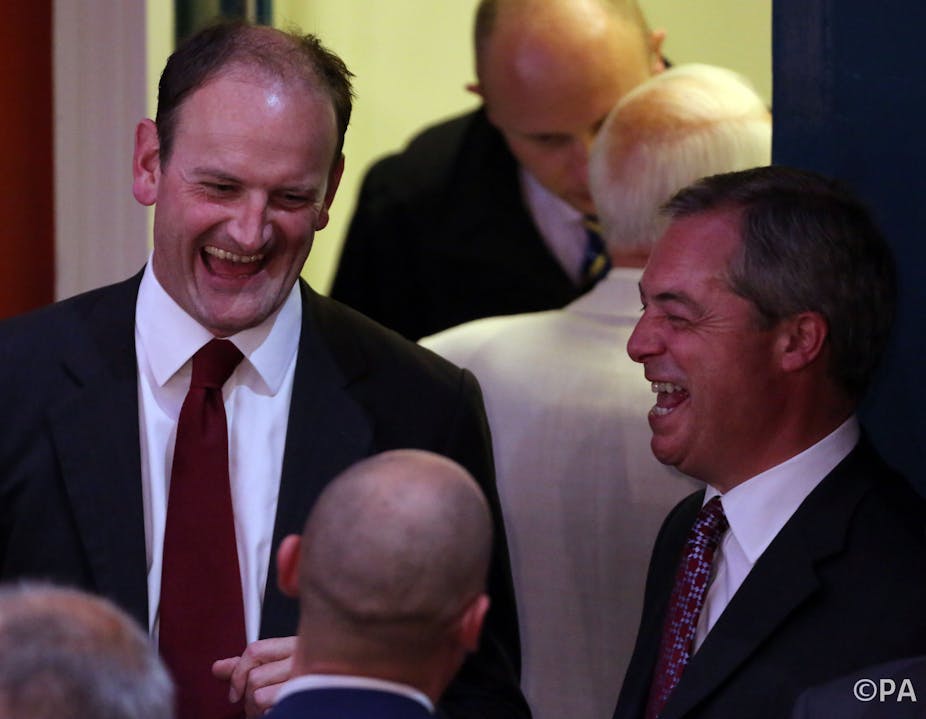The results of the by-elections that have just taken place in Clacton and Heywood and Middleton are virtually impossible to spin for either the Conservatives or Labour. Predictably, each side of Britain’s crumbling two-party divide has attempted to paint the results as worse for the other. But the simple truth is, the outcomes are good news for UKIP and nobody else.
In Clacton, UKIP candidate Douglas Carswell trounced all opposition. Labour won the Heywood and Middleton seat but only narrowly saw off the upstart party.
This confirms a pattern that has been emerging over the past couple of years. UKIP is uniquely placed to appeal to voters in both southern counties and in northern towns. Certainly, there are areas in which the party has struggled to break through, such as Greater London, Scotland and the central cores of England’s big cities, but UKIP’s mission to displace the Liberal Democrats as the UK’s third party is now well advanced.
There are signs that the penny has dropped, at least for the Tories. They have begun to adopt the mind games so beloved of football managers, claiming that yesterday’s result plays into Labour’s hands.
But these by-elections confirm the worst fears of both main parties. Carswell has taken what was a safe Conservative seat and Labour’s Liz McInnes came very close indeed to losing what was a safe Labour seat, securing victory by just 617 votes. UKIP stands in the way of a parliamentary majority, or possibly even a viable coalition, after the 2015 General Election.
Back to the drawing board
Until relatively recently, the script for the 2015 general election appeared to have been written and it was a broadly familiar one. Both the main parties could count on winning hundreds of safe seats each and the electoral battle would be won or lost in a smaller number of key marginal seats.
The decline in Liberal Democrat support and the failure of the Tory-backed bill that would change parliamentary boundaries tipped the balance in Labour’s favour. But Labour grew complacent as a result and even assumed that UKIP support could only serve to harm the Tories. The Heywood and Middleton contest proved this misguided, to say the least.
UKIP’s success at the European elections was the other major game changer. The party claimed, with some legitimacy, to be the only party other than Labour or the Conservatives to win a UK-wide election since 1906.
Smart tactics
Meanwhile, UKIP has shown that fighting the next general election one by-election at a time suits it perfectly. The party now has an MP and has chalked up eight second places in by-elections since 2010, in areas as diverse as Barnsley Central, Rotherham, Middlesbrough, Eastleigh, South Shields, Wythenshawe and Sale East, Newark and, now, Heywood and Middleton. Each of these by-elections has helped boost UKIP’s funding drive, its membership, its media coverage and, crucially, the party’s collective self-belief.
Douglas Carswell’s victory, by a huge margin, will embolden other would-be defectors and will greatly enhance his own chances of holding Clacton for UKIP in 2015. All eyes now turn to Rochester and Strood, where Mark Reckless’ chances of winning a second parliamentary seat for UKIP have been significantly lifted.
Rochester and Strood presents a major test for both of the main parties. The Conservatives must win if they are to prevent further defections (of MPs, members, donors and lifelong supporters at the ballot box). And, this close to a general election, Labour must now also demonstrate its ability to counter the relentless rise of UKIP.
A full general election campaign will still be an enormous challenge for UKIP and it will need to target its efforts carefully. But it will enter the election better resourced than any challenger to the big three in living memory. UKIP’s capacity to change constituency-level outcomes by grabbing 15-25% of the votes in key seats will matter just as much as its potential to win further seats outright. For both Labour and the Conservatives, this is unknown electoral territory.

